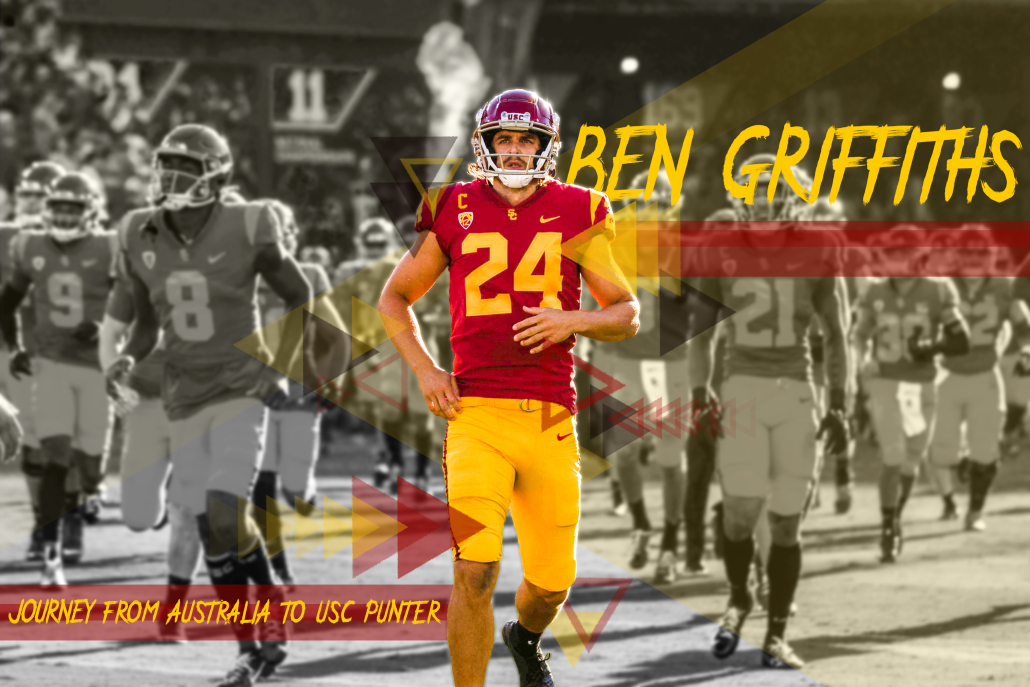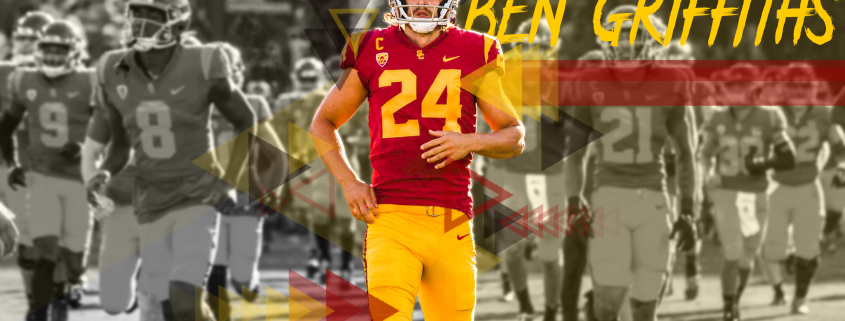Ben Griffiths: Journey from Australia to USC punter

When asked if he remembered his first day in the United States, redshirt junior punter Ben Griffiths looked to the right and chuckled. His long, twirly mustache rose up as he spewed the details.
He said it went like this: After his 14-hour flight from Melbourne, Australia to Los Angeles, he went to his apartment, changed into a new shirt and headed straight to campus.
Griffiths didn’t wait in line at Dulce or try to catch lunch at Cava. Instead, he went to pick up his USC ID card.
“I was jet lagged as hell,” Griffiths said. “[I] pretty much dropped my bags off at my apartment, didn’t even have time for a shower. I had to go get my student ID done … That was a tough day.”
Although a long way away from the comfort of his home in Australia, Griffiths’ first day is a testament to who the punter is — a true professional and an extremely hard worker.
But, as he traveled to a new country, Griffiths faced a new challenge right: the Australian Football League veteran became a first-time college student at the age of 27.
It was the start of another chapter in his life, one filled with booming punts and sitting in a classroom for the first time in 10 years.
Early life and AFL success
Griffiths’ love for football began during recess. Exposed to Australian football “at a really young age,” Griffiths became serious and joined Auskick, a developmental program in Australia meant for children to get introduced to the sport.
As he rose up in the program’s ranks, making it as a professional became a reality. At 18, drafted out of high school by the Richmond Tigers, Griffiths became a professional player.
The college sports culture prominent in the U.S. doesn’t exist in Australia, Griffiths said. Players are picked out of high school to compete and develop over the years.
“You get recruited from club level and high schools, mainly. Teams, when they draft, you can look at players as more investment,” Griffiths said. “Whereas, I think here you kind of skip that phase because the players between 18 and 21 spend time in college.”
Griffiths became an experienced professional, spending eight seasons with the Tigers before making a decision on his future: He wanted to get a degree to set himself up after retiring from sports permanently.
Australian football began to take a toll on the 6-foot-7, 240-pound man. Injuries stemming from not being fully developed at a young age gave him shoulder problems. Then, as the years went on and injuries persisted, he had a few concussions.
It left him with a choice.
“It put a lot of things in perspective for me. One of them being like, ‘What was I going to do post-football?’” Griffiths said. “Sport is always such a small part of your life. There’s so much lots of life after that.”
It was then where the idea of going to college appealed to Griffiths. Nearing his 30s, he quickly realized sports wouldn’t last forever and transitioned to getting a degree. He retired from the game at 26 and moved on to another football.
USC and learning how to punt
During the first couple of months in the U.S., Griffiths found himself in a precarious situation. At 28-years-old, being a student was taking some time to come back.
”It took me a while to kind of adjust sitting in a classroom again,” Griffiths said. “I found myself getting really fatigued, just from concentrating for so long at a chalkboard.”
As the semester went on, assignments began popping up. No longer only focusing on football, Griffiths had to start setting time aside for school.
He began to worry, not about a roommate or balancing time between school and football, but about turning in his paper for WRIT150 during his freshman year.
He hadn’t fully adjusted to life in the U.S., let alone remembered how to write a structured paper.
“It was a rude awakening when I handed in my first paper and got the first grade,” Griffiths said.
But school was the most difficult of a transition. On the field, Griffiths felt in his comfort zone, backed by strong training.
Once he retired from Australian football, Griffiths learned to punt properly at the academy ProKick Australia, which was built to make the transition from Australian football to college or NFL easier. It was a three-days-a-week camp full of training to make Griffiths comfortable in his move.
Even though kicking the ball is prominent in Australian football and gave him some experience, punting was practically a new skill for him. From his time over at the AFL, Griffiths built up bad habits, making learning how to punt more difficult.
Helping him tremendously with training, the program also matched him directly with USC. No other schools were considered and no other schools would have changed his mind — he was set on becoming a Trojan.
“Once I heard USC was sniffing around, I was pretty keen to kind of lock it down. Given that it’s such a great school. It’s such a storied history and really wanted to be a part of that,” Griffiths said. “But also the fact that, logistically wise, a direct flight in and out of Melbourne.”
His first season at USC, he averaged a whopping 41.2 yards on 52 punts — enough to be voted in the 2019 AP All-Pac-12 second team.
He followed it up his sophomore year with an average of 46.4 yards a punt — the highest average by a Trojan since 2003 — and appearances on the AP and Pro Football Focus first-team.
Standing at nearly 6-foot-8, punters are rarely Griffiths’ height. Despite the untypical size for a punter, Special Teams Coordinator Sean Snyder saw Griffiths’ unique talent the moment he was hired in 2020.
“At the end of the day, I find it hard to find too many better [than him],” Snyder said.
“He’s a great role model” and the NFL
Something else stood out to make Griffiths a top contender for the position outside of his kicking: his leadership and work ethic. Players noticed it during workouts and off the field and named him captain for the 2021 season, the first special teams player to serve in the position since 1998.
Griffiths was shocked about the news.
“I was really blown away,” he said. “I wasn’t expecting it. I’ve been doing the same thing for the last three years. I hold myself to a high standard. And I guess they saw that.”
Others too clearly saw it.
John Smith, who worked directly with Griffiths at ProKick Australia for a year, saw a lot of this leadership in Griffiths. Smith said the unique work ethic and consistency Griffiths brought each and every day.
“Nobody worked harder than Griffiths. Nobody,” Smith said. “He was there all the time. He never dropped anything. He never had any leverage of his status as a professional athlete. He came in and he did everything that everybody else needed to do.”
What stood out to Smith more, though, was Griffiths’ leadership, calling his ability “immense” and his conduct “exemplary.”
When Snyder arrived the summer between Griffiths’ first and second year at USC, the Aussie exploded. His 46.4 yard-average on each punt made him the sixth-best punter in the nation.
Snyder witnessed firsthand Griffiths’ meticulous work ethic to improve his skills.
“His attention to detail at what he was doing and as he’s done that, he just gets better and better and better,” Snyder said. “I mean for him, I think, sky’s the limit.”
Griffiths served as a leader in the locker room, too, playing the role of the older 30-year-old brother to his younger 18-year-old teammates.
“He’s a great role model. Great leader,” freshman safety Jaylin Smith said. “Awesome person to have in the locker room. Good personality. He’s just [an] all-around great guy.”
Leadership is just a part of who Griffiths is. However, he has bigger aspirations.
With two more years of eligibility and his years of experience, Griffiths sets his sight to the next level — playing in the NFL.
The move to the U.S. began with the idea of playing professionally and, as Snyder put it, “He’s gonna have a long future.”
But for Griffiths, there is something more important: his ultimate reason for his decision to make a career change from being an Australian football professional to one in the U.S.
Like everything else in his life, Griffiths approached the NFL process with reason and that same caution that made him a top-punter in the country.
“First and foremost, for me, it was to get a degree,” Griffiths said. “The degree is what’s going to take you further. Sport can set you up, but you’re not going to play for the rest of your life as much as I want.”

